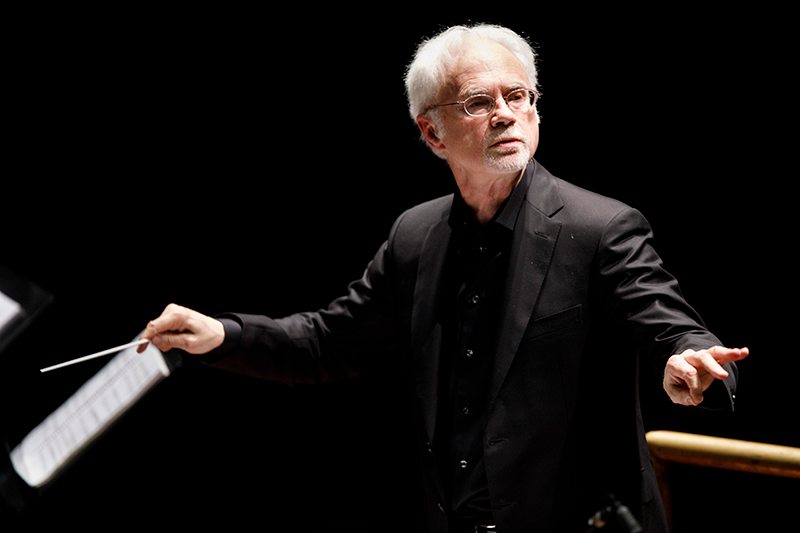John Adams, composer and conductor, discusses his El Niño
by Hannah Edgar
The last time John Adams conducted the May Festival Chorus was on a CSO concert in 2008, for his own 2008 On the Transmigration of Souls, composed in memory of those who died on September 11. The work won the 2003 Pulitzer Prize for Music and immediately secured a vaunted place in the 21st-century canon. Even so, Adams found himself frustrated by live performances of Transmigration, feeling they rarely cohered the work’s acoustic and prerecorded elements.
That May Festival performance helped convince him otherwise. “The pure American quality of their enunciation and their perfectly balanced sonorities lifted the matter-of-fact plainness of the words to a transcendental level, and for once the piece did not seem as compromised and uneven as I had previously thought,” Adams later wrote in his memoir.
Adams returns to conduct his bilingual opera-oratorio El Niño (2000)—“one of my favorite pieces,” he admits. Hard at work on Antony and Cleopatra, his latest opera debuting in San Francisco this fall, Adams answered questions via email.

You started conducting very young, while you were still a teenager. Did you formally study conducting with anyone?
The only “lessons” I had were during one summer at a music festival; my teacher had been a pupil of the great Nadia Boulanger. Other than that, I learned a lot about conducting from playing in orchestras. I was often called to substitute in the clarinet section of the Boston Symphony when I was in college, so early in my career I learned firsthand what orchestra players appreciate (a good upbeat, helpful cues, efficient rehearsing, don’t waste their time) and what they dislike (conductors who haven’t prepared, who talk too much, or who keep stopping).
Have you sung in a chorus yourself?
This will probably come as no surprise to singers who struggle with my choral writing, but I’ve never sung in a chorus or taken voice lessons. Nonetheless, I love the sound of massed voices.
My first commission as a young composer was from the San Francisco Symphony, for a work for chorus and orchestra. If they’d known how little experience I’d had with chorus, I’m sure they wouldn’t have proposed that. But they did, and the piece that resulted was Harmonium, a work which after 30 years continues to get a lot of performances.
So…what can I say? Beginner’s luck? All of my operas and oratorios have large choral forces involved. In fact, Nixon in China, The Death of Klinghoffer and Doctor Atomic all start with choruses.
What works do you gravitate towards conducting?
I consider it a privilege to be able to make programs around my music. When I did my Absolute Jest in Vienna a few years ago, a piece for string quartet and orchestra based on fragments of Beethoven, they asked me to pair it with a Beethoven symphony. So, there I was, doing something I’d never in my life imagined: conducting my favorite Beethoven, the Fourth Symphony, in Vienna!
Likewise, I do 20th-century music that speaks to me on a very deep level: Sibelius, Ravel, Debussy, Bartók, Stravinsky, Copland and, of course, the music of my colleagues Steve Reich and Philip Glass. And all through my 40-plus years of performing I have done many premieres by young composers, several of whom are now making real waves.